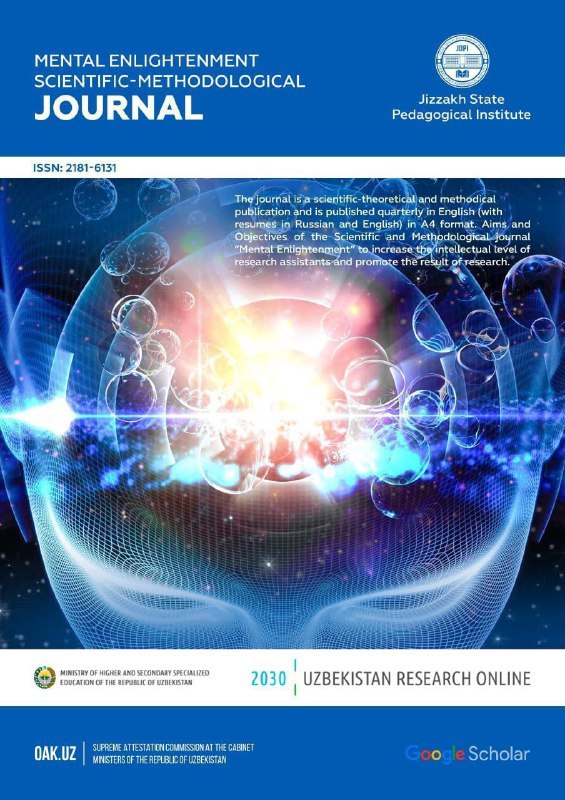Аннотация
This article is devoted to the issues of methodology of teaching English to students of non-philological Education. This Article discusses using Information Technologies as the important source in teaching Foreign Languages.
Как цитировать
Библиографические ссылки
. Resolution of the President of the Republic of Uzbekistan dated November 6, 2020 No PR-4884 “On additional measures to further improve the education system”;
. Resolution of the Cabinet of Ministers of the Republic of Uzbekistan dated May 8, 2013 No 124 “On approval of the state educational standard for foreign languages in the system of continuing education”;
. Resolution of the Cabinet of Ministers of the Republic of Uzbekistan dated April 6, 2017 No 187 “On approval of state educational standards of general secondary and secondary special education”;
. Resolution of the Cabinet of Ministers of the Republic of Uzbekistan dated December 22, 2020 No 802 “On approval of the State Standard of Preschool Education and Upbringing”;
. Zinchenko G.P. Prerequisites for the formation of the theory of lifelong learning// Soviet pedagogy, 1991. N 1.
. Konstantinovsky D. L. Social and Humanitarian Education: Orientations, Practices, Resources for Improvement ./ [Voznesenskaya E.D., DimarskayaO.Y., Cherednichenko G.A..]. —Moscow: SSP, 2006. — 264 p..
. Kalinnikova N. G. Lifelong Pedagogical Education as a Paradigm// Knowledge. Understanding. Skill, 2005. — №3. — p. 186–189.
. Arnautov V. V., Sergeyev N. K. History and current state of continuing teacher education // Educator. 2001. — № 2. — P. 4–11.
. Maslov V.I. Lifelong learning: approaches to the essence / Maslov V.I., Zvolinskaya N.N., Kornilov В.М. // Works of scholars GSOLIFKA: 75 years: Yearbook. — M., 1993. — P.102–117.
. Petryaevskaya D. G. G. Continuing Education as a Prerequisite for Overcoming Crises in Teachers' Professional Development: PhD. Candidate of Pedagogical Sciences.. — SPB., 1994. — p.24.
. Sharipov, Shavkat (2020) "Symbiosis of civilizations as an important factor in the formation and development of scientific thinking in Uzbekistan," Mental Enlightenment Scientific-Methodological Journal: Vol. 2020:Iss.1,Article33.Availableat: https://uzjournals.edu.uz/tziuj/vol2020/iss1/33
. Sharipov, Shavkat and Rakhmonova, Gulrukh (2021) "Successive Development of the Creative Person in the Continuous Education," Mental Enlightenment Scientific-Methodological Journal: Vol. 2021 : Iss. 4 , Article 1. Available at: https://uzjournals.edu.uz/tziuj/vol2021/iss4/1
. Shavkat S. Sharipov, (2022). “The Continuity of the Process of Developing Creative Individuals in the System of Uninterrupted Education” International Journal of Special Education http://internationaljournalofspecialeducation.com ISSN 0827-3383, Vol. 37 No. 2 (2022): Volume 37 Number 2 Year 2022
. Sherali S. Abduraimov. Perfection of Technology of Preparation of Future Teachers of Vocational Education To The Designing Activity Tне Main Contents Of The Dissertation // International Journal of Advanced Science and Technology Vol. 29, No. 8s, (2020), pp. 2205-2215.
. Sherali S. Abduraimov (2022). “Stages of Inter-Industry Integration in Ensuring the Quality of Training and Employment of Personnel” International Journal of Special Education http://internationaljournalofspecialeducation.com ISSN 0827-3383, Vol. 37 No. 2 (2022): Volume 37 Number 2 Year 2022
Авторы
Shakhnoza Rakhmatullaeva
Jizzakh State Pedagogical University
Ключевые слова:
teaching, professional skills, language skills, Information Technology, non-philological educational institutionsВыпуск
Раздел: Статьи
Copyright (c) 2022 Журнал иностранных языков и лингвистики

Это произведение доступно по лицензии Creative Commons «Attribution-ShareAlike» («Атрибуция — На тех же условиях») 4.0 Всемирная.


